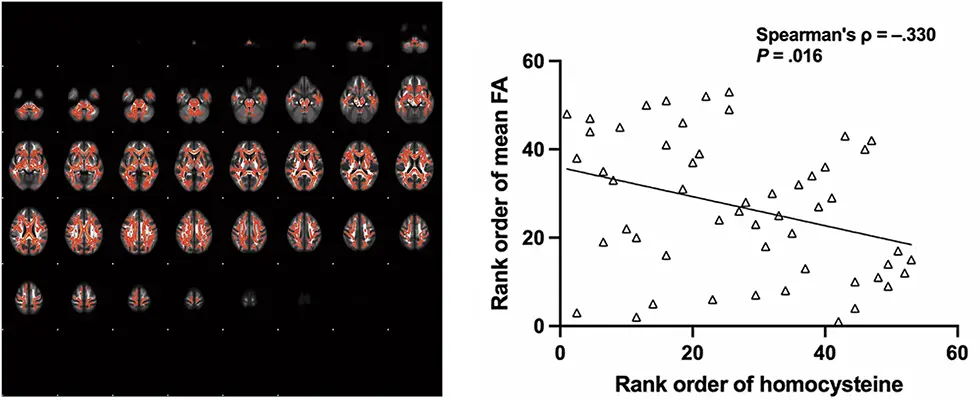
- HOME
- Schizophrenia Research Project
Schizophrenia Research Project
A novel approach to the prevention and treatment of schizophrenia: Understanding the Role of Glycation and Oxidative Stress in Adolescence
Achievements in 2024
Recently, it has been reported that increased plasma homocysteine (Hcy) levels are associated with the risk of developing schizophrenia (SZ) and its severity. In vivo and in vitro studies have shown that Hcy promotes oxidative stress and inflammation, and damages of white matter (WM).
Additionally, large-scale studies using diffusion tensor imaging (DTI) have reported lower fractional anisotropy (FA), an indicator of WM dysconnectivity, in people with SZ. However, the underlying mechanism of WM dysconnectivity in SZ remains unclear. We investigated the relationship between plasma Hcy levels and WM microstructure in 53 individuals with SZ and 83 healthy controls (HC) using DTI. A significant negative correlation between plasma Hcy levels and WM microstructural disruption was found in the SZ group but not in the HC group. Our results suggest that increased Hcy may be associated with WM dysconnectivity in SZ, and the interaction between Hcy and WM dysconnectivity may be a potential mechanism of the pathophysiology of SZ (Schizophrenia. 2024).

Publications
Papers in 2024
- Tabata K, et al. (2024) “Association of homocysteine with white matter dysconnectivity in Schizophrenia (Heidelb). 10(1):39.
- Asakura M, et al. (2024) “Anthocyanins as potent inhibitors of pentosidine synthesis: Antioxidant-mediated effects.” Biochem Biophys Res Commun. 740:151007.
- Asakura M, et al. (2024) “Anthocyanins as potent inhibitors of pentosidine synthesis: Antioxidant-mediated effects.” Biochem Biophys Res Commun. 740:151007.
- Watanabe A, et al. (2024) “The origin of esterase activity of Parkinson’s disease causative factor DJ-1 implied by evolutionary trace analysis of its prokaryotic homolog HchA.” J Biol Chem. 300(7):107476.
- Lo T, et al. (2024) “Association between copy number variations in parkin (PRKN) and schizophrenia and autism spectrum disorder: A case-control study.” Neuropsychopharmacol Rep. 44(1):42-50.
- Nakatochi M, et al. “Copy number variations in RNF216 and postsynaptic membrane-associated genes are associated with bipolar disorder: a case-control study in the Japanese population.” Psychiatry Clin Neurosci. in press
Key papers
- Toriumi K, et al. (2023) “Glucuronic acid is a novel source of pentosidine, associated with schizophrenia.” Redox Biol 67:102876.
- Suzuki K, et al. (2022) “Role of advanced glycation end products in the longitudinal association between muscular strength and psychotic symptoms among adolescents.” Schizophrenia (Heidelb). 2022;8(1):44.

